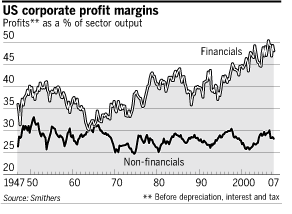Taxpayers on both sides of the Atlantic should be depressed by yesterday's decision by the US authorities to revise their Bear Stearns bail-out terms. Instead of lending JP Morgan $30bn against the collateral of Bear assets, US taxpayers are now effectively taking ownership of those (v dodgy) assets, with Morgan simply chipping in the first $1bn of any losses... and there will be losses.
When the Fed announced the original deal, we applauded. Comparing it to the botched handling of the Crock, we liked the speedy resolution, the fact that US taxpayers' exposure was limited, and the fact that Bear shareholders had paid by losing virtually everything. But under the revised deal, US taxpayers have taken $29bn of the most toxic debt, and Bear shareholders have been handed back 5 times more than the original offer. Bear's management and board remain in place, and the taxpayer won't even get a share of Morgan's likely upside.
The message from the Fed to risk-chasing banks is all too clear - do what you like; no need to worry about the Armageddon scenario because we'll always bail you out. No wonder bank shares have bounced.
Commenting on this, the fact that the Fed will be holding its toxic debt portfolio via one of those now notorious special purpose vehicles, and the fact that the collateral for its future loans to investment banks will be valued by the banks themselves, ex-Bank of England Monetary Policy Committee member Prof Willem Buiter asks "time for a tax payer class action suit?"
Where do we sign?
But for those of us who believe in free markets, the gloom is even deeper. As Martin Wolf points out, the inevitable consequence of this banking crisis is more regulation. Legislators will demand it and the cap-in-hand banks will hardly be in a position to resist. Indeed, they are actively inviting it: Joseph Ackermann, chief executive of Deutsche Bank, says that “I no longer believe in the market’s self-healing power”.
But we have no faith in the ability of regulators to do much better. The history of financial regulation is the history of unintended consequences (most recently the US Sarbanes-Oxley legislation driving many US financial firms across to London).
What's more, the actual people who work for regulators are rarely up to the job envisaged by legislators. As we have seen only too clearly with the FSA and the Crock, they are simply not confident enough to challenge aggressive bank management (and the ex-building society types who ran NR were hardly the raw meat eating brain-boxes who run investment banks).
We'd much prefer the approach advocated by the excellent John Kay:
"The state cannot ensure the stability of the financial system and a serious attempt to do so would involve intervention on an unacceptable scale. But to acknowledge responsibility for financial stability is to assume a costly liability for failure to achieve it. That is what has happened.
"Since financial stability is unattainable, the more important objective is to insulate the real economy from the consequences of financial instability. Government should protect small depositors and ensure that the payment system for households and businesses continues to function...
We cannot prevent booms and busts in credit markets, but today’s regulation of risk and capital – which is more reflective of what has occurred than of what may occur – does more to aggravate these cycles than to prevent them. Regulation in a market economy is targeted at specific market failures and should not be a charter for the general scrutiny of business strategies of private business. Banking should be no exception."
Hear, hear.
PS We'll be posting on the FSA drains-up report when we've read it.
